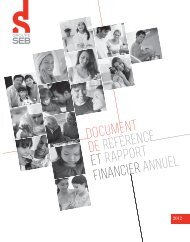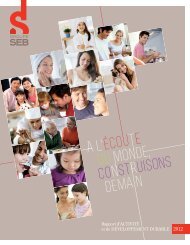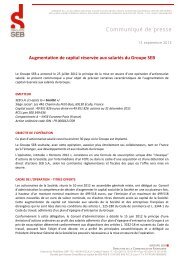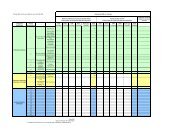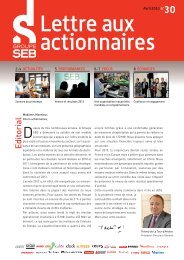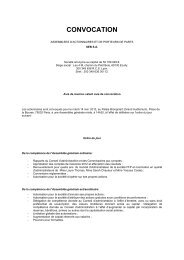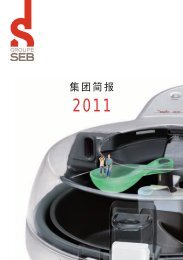Financial Report and Registration Document 2010 - Groupe Seb
Financial Report and Registration Document 2010 - Groupe Seb
Financial Report and Registration Document 2010 - Groupe Seb
You also want an ePaper? Increase the reach of your titles
YUMPU automatically turns print PDFs into web optimized ePapers that Google loves.
1<br />
GROUPE SEB IN <strong>2010</strong><br />
MANAGEMENT REPORT ON <strong>2010</strong><br />
with the pre-crisis level. The Group’s situation eased in all the countries of<br />
the zone except in Venezuela, which is in full recession. In Brazil, beyond<br />
the favourable economic climate, the enormous growth of the middle class,<br />
known as “C”, reinforced by access to the consumption of about 40 million<br />
people primarily located in the Nordeste, generated a very positive dynamic<br />
on dem<strong>and</strong>. Taking advantage of aggressive product plans <strong>and</strong> a reorganized<br />
sales force, <strong>Groupe</strong> SEB reported a very good year in Brazil: solid business<br />
recovery <strong>and</strong> the recapture of cookware market shares; reinforcement of<br />
leadership in small electrical appliances thanks in particular to the success<br />
of fans, the renewal of the entire range of blenders, the upgrading of<br />
Dolce-Gusto or the Respect hair straightener, marketed among others<br />
through the booming “beauty shops” outlets; the massive expansion of<br />
the Group’s own retail outlets, which, at the end of <strong>2010</strong>, amounted to<br />
22 in the country, versus 4 at the end of 2009. In Colombia, the Group’s<br />
second largest market in South America, business was very positive for the<br />
majority of the product families <strong>and</strong> was further boosted by the opening of<br />
10 new shops in <strong>2010</strong>. In the other countries, <strong>and</strong> especially in Argentina <strong>and</strong><br />
Chile, the Group reported excellent performance on the basis of an extended<br />
product offer <strong>and</strong> the development of its own retail outlets (3 openings in<br />
Argentina <strong>and</strong> 6 in Chile).<br />
In Asia <strong>and</strong> Pacific, the strong business growth throughout the year was<br />
sharply driven by the vibrant Chinese market, which represents the Group’s<br />
second largest market in size. Supor actively contributed to this dynamic<br />
performance with a 30% increase in domestic sales in <strong>2010</strong> despite a<br />
more modest increase in the fourth quarter due to the difficulties in 2009.<br />
In the field of cookware, which made up a third of its sales in China, Supor<br />
strengthened its leadership, despite fierce competition, thanks to the<br />
success of its latest models of woks, frying pans, saucepans <strong>and</strong> steam<br />
cookers, Thermospot <strong>and</strong> the Ingenio concept (removable h<strong>and</strong>les), but also<br />
thanks to significant progress in several key accounts. In small electrical<br />
appliances (two thirds of its sales), Supor reported strong growth in all its<br />
product families <strong>and</strong> created development drivers through its entry into new<br />
segments (kettles, blenders, etc.). At the same time, Supor continued to<br />
develop its “Supor Lifestores” on the Chinese territory <strong>and</strong>, at the end of the<br />
year, had 804 of its own retail outlets (+272 outlets compared to end 2009).<br />
In Japan, in a dismal economic context, shrinking purchasing power led<br />
to a contraction in consumption; the Small Household Equipment market<br />
stayed on an uptrend, but with a more significant price orientation. Sales<br />
in <strong>2010</strong> remained steady but the slowdown in growth observed in the third<br />
quarter was confirmed <strong>and</strong> emphasized in the last months. In Korea, we rely<br />
on a sturdy business in cookware <strong>and</strong> the opening of new electrical product<br />
categories (food preparation, personal care, etc.) to continue moving forward.<br />
Lastly, in Australia, consumption remained slack <strong>and</strong> the Group suffered.<br />
The end of the year was slightly more positive <strong>and</strong> allowed a partial offsetting<br />
of the delay accumulated in the first half.<br />
In Central Europe, Russia <strong>and</strong> other countries (Turkey, <strong>and</strong> Middle-East<br />
countries, Africa, etc.), the return to growth in <strong>2010</strong> – confirmed from quarter<br />
to quarter – occurred in a context of more competitive <strong>and</strong> promotional<br />
markets than before. The zone is heterogeneous <strong>and</strong> situations remain<br />
mixed depending on the country. In Russia, dem<strong>and</strong> recovered <strong>and</strong> the<br />
Group was able to redeploy its sales, although it has not returned to its<br />
“pre-crisis” levels. Retailers, more focused than previously, maintained a<br />
cautious stocks policy <strong>and</strong> gave preference to quick turnover products.<br />
The Group renewed its successes in ironing, kettles, meat mincers <strong>and</strong><br />
personal care, supported by advertising <strong>and</strong> marketing investments which<br />
turned out to be very lucrative. In Ukraine, in a more favourable environment,<br />
the Group confirmed its leadership <strong>and</strong> left the No. 2 lagging far behind as<br />
it dominated the market with its small electrical appliances such as kettles,<br />
breadmakers, hair straighteners <strong>and</strong> the launch of Dolce Gusto. In Turkey,<br />
the Group accumulated some delay in the fi rst half compared to the fast<br />
take-off of the market, but it began to correct the situation in the second<br />
half of the year, regaining positions in small electrical appliances thanks to<br />
an enhanced mix, <strong>and</strong> in spite of strong <strong>and</strong> active local competition. Lastly,<br />
in Central Europe, the recovery is taking much longer <strong>and</strong> consumption<br />
is still weak. Against this background, our sales nevertheless improved at<br />
the end of the year, especially in Pol<strong>and</strong>, offsetting the bad first half, with<br />
more vibrant trading activity in electric products (drawn by Actifry, vacuum<br />
cleaners, Dolce Gusto, steam generators, hair straighteners, etc.) but a clear<br />
contraction in cookware.<br />
1<br />
COMMENTS ON <strong>2010</strong> RESULTS<br />
INCOME STATEMENT<br />
At €438,000, <strong>Groupe</strong> SEB’s <strong>2010</strong> operating margin increased by 23.2%<br />
compared to 2009, accounting for 12% of sales (11.2% in 2009 <strong>and</strong> 10.6%<br />
in 2008). This positive change is linked to a set of factors, whose positive<br />
effects were ultimately mixed:<br />
the improvement in the economic situation as well as the proper<br />
performance or recovery of markets led to a sharp rise in sales volumes<br />
with a very positive impact on the trading activity of the Group’s plants<br />
<strong>and</strong> on the absorption of production costs. The phenomenon is all the<br />
more significant given that the production capacities of the sites had been<br />
under-utilized in 2009 <strong>and</strong> this led to sub-absorption of manufacturing<br />
costs. Taken together, the increase in sales <strong>and</strong> its impact on the utilisation<br />
of industrial capacities led to a volume effect on the operating margin of<br />
over €150 million;<br />
the slightly-shrinking price-mix effect due to price reductions <strong>and</strong> targeted<br />
promotional operations in certain countries where there had been<br />
substantial increases in 2009. These price reductions were intended to<br />
preserve the dynamism of the Group’s market. The product mix is still<br />
good thanks to the quality of the Group’s sales, despite a strong history<br />
<strong>and</strong> tighter markets;<br />
foreign currencies made a positive contribution of up to €32 million<br />
to the operating margin, while their impact was hugely negative in<br />
2009 (-€87 million). This effect is due to the nearly widespread appreciation<br />
of the Group’s operating currencies (real, rouble, yuan, yen, pound sterling,<br />
Turkish lira, won, zloty, etc.) against the euro, for which the positive impact<br />
on the translation of the operating margin into euros significantly exceeded<br />
the negative impact of the dollar’s reinforcement on procurement <strong>and</strong><br />
purchasing conditions;<br />
the unfavourable differences on purchases, linked in particular to the<br />
inflation of raw material costs, were generally limited since the additional<br />
cost amounted to €19 million, a significant portion of which was linked to<br />
the effect of aluminium price hikes on purchases of Supor, which has no<br />
hedging instruments. In <strong>2010</strong>, the Group thus succeeded in containing<br />
increases on commodities as well as on components or finished products,<br />
but is anticipating a greater impact in 2011;<br />
GROUPE SEB<br />
FINANCIAL REPORT AND REGISTRATION DOCUMENT <strong>2010</strong><br />
15



